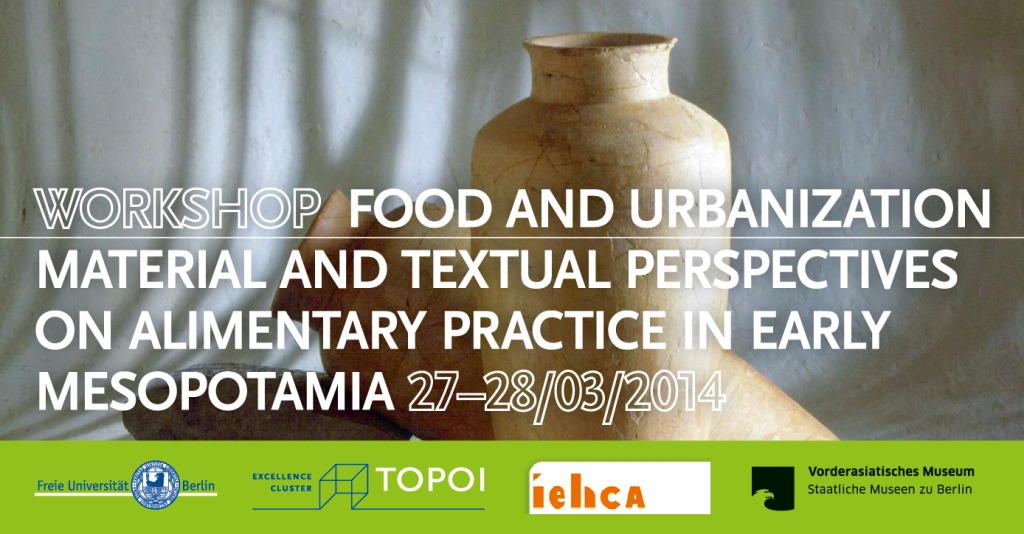
Workshop organized by
Freie Universität Berlin
Institut für Vorderasiatische Archäologie
Institut für Altorientalistik
Exzellenzcluster Topoi
In Cooperation with:
Vorderasiatisches Museum
Staatliche Museen zu Berlin – Preußischer Kulturbesitz
Financed by:
L’Institut Européen d’Histoire et des Cultures de l’Alimentation
Practices connected to the procurement, processing and consumption of food as well as methods for auditing these activities are crucial elements of social process generally and were at the very heart of the urbanization that arose in fourth millennium BCE southwestern Asia (Mesopotamia). The first highly stratified societies in ancient Mesopotamia were instituted, to a great degree, on basis of elite control over food resources of one kind or another. And it was in the process of tracking the storage and distribution of these foodstuffs that Mesopotamian bookkeeping came into existence, which was the first writing system in history, but more importantly for our purposes a concrete means of auditing the movement of foodstuffs through the administrative and social apparatus of the early state. Whether elite “control” operated primarily in the marshaling of labor forces for irrigation and agricultural activities, the storage of crops and their distribution as rations, or alternatively the role of feasting and micro-distributions – in the form of meat, beer and dairy products as well as soups and cakes – as part of the articulation of hierarchical strata within elite institutions, the medium through which these early urban institutions came into being was the extraction, manipulation and representation of food. Given the overwhelming importance of food in the earliest phases of ancient Near Eastern history, it is remarkable that the social organization and spatial location of Mesopotamian culinary practices (including intervening and subsequent bookkeeping techniques) have only rarely been investigated in detail. Moreover, previous investigations have often suffered from a rigid disciplinary separation between philologists and archaeologists and this has led to the emergence of largely parallel discussions of food in philological and archaeological terms, often without attempting to leverage existing bodies of knowledge in the adjacent discipline.
The workshop will bring together researchers specializing in the material culture and the textual evidence from Mesopotamia and the adjoining regions in the late fourth millennium (ca. 3600–3000) BCE in order to catalyze and move beyond existing analyses of food procurement, processing, consumption and administration in what is, after all, one of the earliest examples of urbanization and social stratification in human history.
Financed by: L’Institut Européen d’Histoire et des Cultures de l’Alimentation
CREDITS
Foto: Roberto Ceccacci
27.3.2014 | |
09:30 - 10:00 | Welcome and introduction to the workshop Maria Bianca D'Anna Carolin Jauß J. Cale Johnson |
10:00 - 11:45 | Storing, pouring, eating, meeting. Ceramic vessels and alimentary practice Carolin Jauß |
10:00 - 11:45 | Understanding food processing and consumption in the Late Uruk period via absorbed organic residue analysis Marisol Correa Ascencio |
10:00 - 11:45 | Food and containers for food in the archaic textual record Klaus Wagensonner |
14:00 - 18:00 | Meeting the objects of our studies Tour of the archives and hands-on work with artefacts from Uruk and Habuba Kabira at the Vorderasiatisches Museum, Berlin – workshop participants only |
28.3.2014 | |
09:00 - 10:30 | Food control at the time of centralization. Storing, cooking and eating at Arslantepe-Malatya Maria Bianca D'Anna |
09:00 - 10:30 | From the animals to the meals. The contribution of zooarchaeology to the knowledge of alimentary practices during the Uruk period Rémi Berthon |
09:00 - 10:30 | The price of urbanization? Body height development in Europe and the Near East around 3000 BC Eva Rosenstock |
10:45 - 11:15 | The production and storage of food in Early Iran Jacob L. Dahl |
10:45 - 12:15 | Food and food practices according to the Ur III administrative record Hagan Brunke |
13:45 - 15:30 | Food and urbanization in Mesopotamia in the 4th millennium BC. An archaeobotanical view Reinder Neef |
13:45 - 15:30 | Ovens, fireplaces and the preparation of food in Uruk Mesopotamia Susan Pollock |
13:45 - 15:30 | Defining institutional scale in the Late Uruk and the Early Dynastic feast records J. Cale Johnson |
